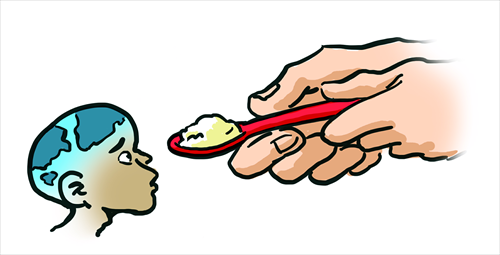HOME >> OP-ED
China and US can use biotechnology to end scourge of global hunger
By Michael T. Scuse Source:Global Times Published: 2013-11-17 20:28:01

Illustration: Liu Rui/GT
The US and China were both built by farmers, and have deep agricultural heritages that continue to thrive today. We are the world's two largest agricultural producers and strong collaborators in agricultural trade, research and education.
The rapid development of China-US agricultural cooperation and trade has provided tremendous benefits, enhancing food security and living standards in both our countries. Together, we have a tremendous capacity to build a better world.
While we have already made great progress, one in eight people in the world still suffers from hunger. Current global population trends mean we must increase agricultural production by 70 percent by 2050 to feed an expected 9 billion people.
A changing climate, increasing urbanization, and limited resources compound this challenge. We must work together, leveraging resources to support farmers and strengthen agriculture at all levels.
Farmers are already working to meet these challenges by embracing new ideas and practices to become more productive. New technologies are emerging from the imagination and hard work of scientists in both our countries.
In 1987, Nobel Peace Prize winner Norman Borlaug created the World Food Prize to celebrate those who advance human development by increasing the quality, quantity or availability of food in the world. Two great Chinese citizens have already been awarded with this prestigious prize, former minister of agriculture He Kang and inventor of hybrid rice Yuan Longping.
This year the World Food Prize was awarded to Marc Van Montagu, Mary-Dell Chilton and Robert Fraley. Their fundamental research on plant genomics has advanced our understanding of the crops we grow.
I am a farmer, and like 17 million farmers around the world, have seen the benefits of crops improved through biotechnology. By accelerating the results of plant breeding, biotechnology is helping the world develop crops that can resist drought and pests, and even grow in adverse environmental conditions, such as salty and toxic soils. This research gives me hope for the future.
The dialogue on biotechnology and other technologies will continue, but my hope is that this dialogue will be grounded in facts, and solutions oriented.
Biotechnology has been extensively researched and safely used for three decades. Most US families, including my own, safely consume food made from biotech crops on a daily basis. The challenges we face are too extensive to reject the promise of science.
While increased production is a necessity, it is not the whole answer for increasing food security and eliminating hunger. We must also ensure that food gets to where it is needed through improved distribution networks.
Even with our best efforts, food production in many areas will be constrained by limited resources and prevailing or changing weather patterns.
Improved global and regional trade must be part of the solution in providing global food supplies and food security. Trade encourages dietary diversity, drives economic opportunity, stabilizes food supplies and can reduce food costs.
Strong trade relations, including in agriculture, have already brought enormous benefits to the people of both our countries. We should continue to deepen trade and investment in agriculture. If we use all the tools available to us, together we can feed a hungry world.
The author is Under Secretary for Farm and Foreign Agricultural Services, US Department of Agriculture. opinion@globaltimes.com.cn
Posted in: Viewpoint